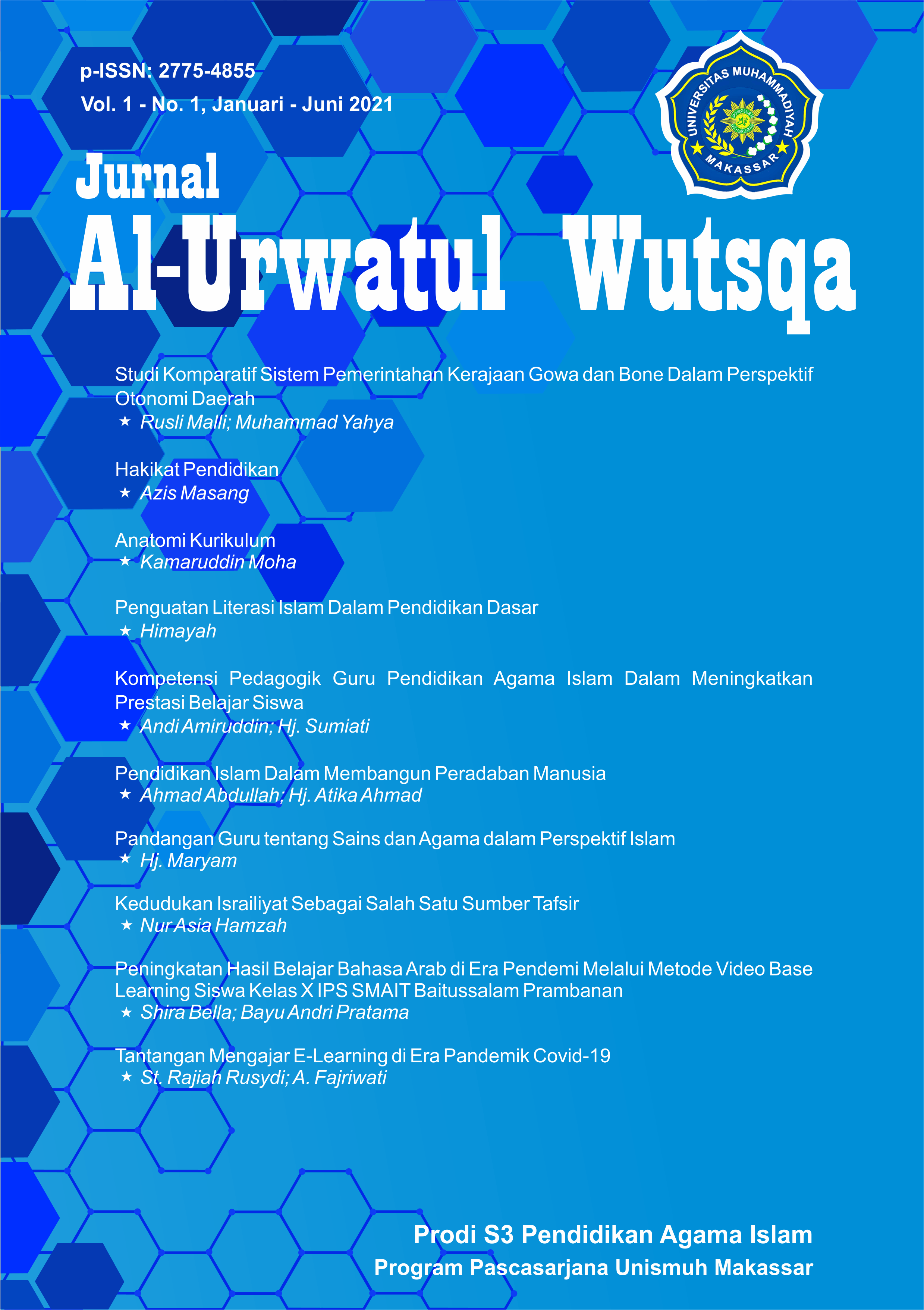PANDANGAN GURU TENTANG SAINS DAN AGAMA DALAM PERSPEKTIF ISLAM
Abstract
Tulisan ini menelaah sebuah studi yang mengeksplorasi pandangan guru tentang agama dan sains dalam konteks Islam. Penelitian ini menyoroti pertimbangan ontologis dan epistemologis dari cara-cara di mana para guru sains memahami hubungan pelajaran sain dengan mengacu pada kandungan dalam Al-Qur'an yang membahas tentang sains dan ilmu pengetahuan. Studi ini dibangun di atas skema kategorisasi melalui pengumpulan dan analisis data dan untuk mendapatkan interpretasi para guru sains. Teori multigrounded dan kerangka analitis Roth dan Alexander digunakan untuk menafsirkan bagaimana guru mengakomodasi hubungan antara sains dan agama dalam kepercayaan mereka. Temuan menunjukkan bahwa pandangan narasumber tentang hubungan antara sains dan Islam, menegaskan bahwa keyakinan guru pada pemikiran mereka mengenai sains dan Islam. Para guru tidak menganggap tidak ada kontradiksi dalam sains dan Islam. Oleh karena itu, dapat disimpulkan bahwa keyakinan agama Islam secara pribadi para guru menunjukkan keselarasan yang baik
Kata Kunci: Sains; Alquran; Agama IslamReferences
Abd-El-Khalick, F., Bell, R. L., & Lederman, N. G. (1998). The nature of science and instructional practice: Making the unnatural natural. Science Education
Abd-El-Khalick, F., & Lederman, N. G. (2010). Improving science teachers’ conceptions of nature of science: A critical review of the literature. International Journal of Science Education.
Ahmed, I. (1999). Islamic contributions to modern scientific methods. Lecture delivered on the occasion of the Tenth Anniversary of the Centre for Faith and Science Exchange, the Islamic Society of Boston, Wayland, MA.
Ahmed, I. (2012). The rise and fall of Islamic science: The calendar as a case study. Paper presented at the conference on Faith and Reason: Convergence and Complementarity, Al-Akhawayn University, Ifrane, Morocco.
Akhtar, S. W. (1984). The Islamic concept of knowledge. Al-Tawhid, Vol. XII, No. 3.
Al-Hayani, F. A. (2015). Islam and science: Contradiction or concordance. Zygon, 40(3).
Ali, Y. A. (2004). The meaning of the Holy Qur’an: English translation.
Barbour, I.A. (1997). Religion and science: Historical and contemporary issues. San Francisco, CA: HarperCollins.
Barbour, I. A. (2000). When science meets religion: Enemies, strangers or partners? San Francisco, CA: HarperCollins.
Charmaz, K. (2006). Constructing grounded theory: A practical guide through qualitative analysis. London: Sage.
Davies, P. (1992). God and the new physics. London: Penguin Books.
Deniz, H., Donnelly, L., & Yilmaz, I. (2018). Exploring the factors related to acceptance of evolutionary theory among Turkish preservice biology teachers: Toward a more informative conceptual ecology for biological evolution. Journal of Research in Science Teaching.
Duschl, R. A. (1990). Restructuring science education: The importance of theories and their development. New York: Teachers College Press.
Ezzy, D. (2012). Qualitative analysis: Practice and innovation. London: Routledge.
Hefner, P. (2012). How science is a resource and a challenge for religion: Perspective of a theologian. Zygon.
Hokayem, H., & BouJaoude, S. (2018). College students’ perceptions of the theory of evolution. Journal of Research in Science Teaching.
Kalin, I. (2006). Islam and science: Notes on an ongoing debate. In A. Eisen & G. Laderman (Eds.), Science, religion, and society: An encyclopaedia of history, culture, and controversy. Armonk, NY: M.E. Sharpe, Inc.
Kamali, M. H. (2013). Islam, rationality, and science. Islam and Science, 1, 90 – 120.
Katz, S. H. (2012). Questions for a millennium: Religion and science from the perspective of a scientist. Zygon, 37
Khan, M. (2007). The translation of the meanings of summarized Sahih Al-Bukhari: Arabic – English. Chicago: Kazi Publications.
Lederman, N. G. (1992). Students’ and teachers’ conceptions about the nature of science: A review of the research. Journal of Research in Science Teaching, 29(4), 331 – 359.
Mansour, N. (2018). Religious beliefs: A hidden variable in the performance of science teachers in the classroom. European Educational Research Journal, 7(4), 557 – 576.
Patton, M. Q. (2012). Qualitative research & evaluation methods (3rd ed.). Thousand Oaks, CA: Sage.
Reiss, M. J. (2014).What is science? Teaching science in secondary schools. In E. Scanlon, P. Murphy, J. Thomas, & E. Whitelegg (Eds.), Reconsidering science learning (pp. 3 – 12). London: RoutledgeFalmer.
Roth, W.-M., & Alexander, T. (1997). The interaction of students’ scientific and religious discourses: Two case studies. International Journal of
Smith, M. U., & Scharmann, L. C. (1919). Defining versus describing the nature of science: A pragmatic analysis for classroom teachers and science educators. Science Education, 83(4), 493 – 509.
Stolberg, T. L. (2018). Understanding the approaches to the teaching of religious education of pre-service primary teachers: The influence of religio-scientific frameworks. Teaching and Teacher Education: An International Journal of Research and Studies, 24(1), 190 – 203.
Strassberg, B. A. (2011). Religion and science: The embodiment of the conversation: A postmodern sociological perspective. Zygon, 36(3), 521 – 539.








